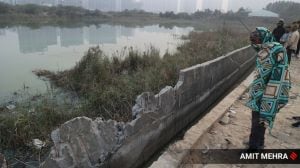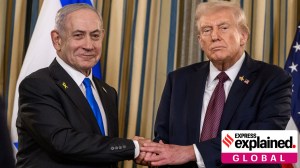War, peace and worry
A four-day meeting between delegates of the Sri Lankan government and the Liberation Tigers of Tamil Eelam commenced in Bangkok on October 3...

A four-day meeting between delegates of the Sri Lankan government and the Liberation Tigers of Tamil Eelam commenced in Bangkok on October 31, 2002, in continuation of the peace process that began with the December 2001 ceasefire in Lanka8217;s secessionist war. On the eve of his departure for Bangkok, Minister G L Peiris, head of the government delegation, stated that the meeting will formulate a joint appeal for development assistance for submission to the donor community scheduled to meet in Oslo next month.
This would entail the setting up of a 8216;Joint Task Force8217; entrusted with rehabilitating and reconstructing the war-ravaged north-east. Peiris added that the third session is to be held in December 2002, after which he expects the ceasefire agreement to have been 8216;8216;consolidated8217;8217;. The second round of negotiations will begin in January 2003 and will focus on 8216;8216;interim mechanisms8217;8217;8212; an interim administration for the 8216;north-east8217;, pending the final settlement of the ethnic conflict. The third round, he speculated, would commence in December 2003, and would deal with the 8216;core issues8217; of the conflict.
It is now ten months since the government and the LTTE decided to usher in what has turned out to be the longest period of peace the people of Sri Lanka have had since July 1983. From mid-December last year, there have been no mass murders; no political assassinations; no attacks on economic targets. The overall death toll of Lanka8217;s ethnic conflict since 1983, placed at about 65,000, works out to a daily average that approximates 10. By contrast, since the beginning of 2002, the number of conflict-related deaths has been less than 30.
The innumerable barricades and checkpoints along highways have vanished, and people in most parts of the country move about freely. Tamils in the north buy consumer goods at normal prices, and have access to basic services comparable to those provided elsewhere in the country. Over 800 Tamils incarcerated under the Prevention of Terrorism Act have been discharged. About 30 8216;8216;prisoners of war8217;8217; have also been released by the LTTE.
Though the economic 8216;8216;peace dividend8217;8217; is yet to materialise, a trickle of foreign investment has begun, and donors of aid have been making hopeful signs. Tourists are back in fairly large numbers. Colombo8217;s tiny stock market is buoyant. The city hosted the Asian Athletics Championship meet and the ICC Champions Trophy tournament in September8212;unimaginable even as recently as an year ago. It is such considerations that provide the most persuasive rationalisation for the on-going peace effort and the most forceful impulses to ignore or trivialise the illusions and risks these efforts so obviously entail.
|
Ten months after the ceasefire there have been no mass murders; no political assassinations; no attacks on economic targets. Barricades and checkpoints along highways have vanished, Tamils buy consumer goods at normal prices, have better access to basic services |
The illusions and risks are, however, far more noticeable now than they were six weeks ago, when negotiations between the government and the LTTE formally began. Basic contradictions in the approach, ignored for a time in the initial euphoria of peace, have begun to impact upon the negotiation process. Divisions within the ranks of each negotiating party have become more pronounced. And the opposition to the process, though still fairly muted, has gathered momentum.
Perhaps the most important contradiction in the ongoing peace process is that although one of the principal negotiators is identified as the 8216;Government of Sri Lanka8217;, negotiations are, in fact, being conducted by a section of the government8212;the section headed by Prime Minister Ranil Wickremasinghe. One cannot ignore the fact that President Kumaratunga, the head of state, head of government, and commander-in-chief of the armed forces, has remained outside the peace process. The LTTE allegation that she is attempting to sabotage the negotiations lacks substance, but her stance vis-a-vis the negotiations has been incoherent and non-committal, except by way of a barely concealed propagation of an understanding that as leader the People8217;s Alliance PA, she would not allow Wickremasinghe and the ruling coalition United National Front to make electoral gains from the peace process.
In this context, a setback of far-reaching consequence suffered by the UNF in recent weeks is the failure of its attempt at a constitutional curtailment of the President8217;s discretionary power to dissolve Parliament any time after the lapse of one year of a general parliamentary election. Against the backdrop of on-going political changes in the country8212;notably the declining cohesion in the UNF8212;one can no longer rule out the possibility of the presidential power over the parliament being exercised any time after December 5, 2002. This has prompted the LTTE to raise doubt about the UNF8217;s capacity to convert its negotiation pledges into necessary constitutional reforms.
Yet another basic paradox stems from the unavoidable position of equality that needs to be accorded to the LTTE in the negotiations. That this is not merely a problem of protocol has been evident all along in matters such as the 8216;8216;most wanted criminal8217;8217; status of Prabhakaran in India, and the status of the LTTE as a banned terrorist outfit in several countries. This problem assumed sudden prominence when, on October 31, 2002, while negotiations were proceeding in Bangkok, Prabhakaran was convicted and sentenced in absentia by the High Court of Colombo to 200 years imprisonment for one of his innumerable crimes8212;the murder of 76 persons in the bombing of the Central Bank at Colombo in January 1996.
Neither Peiris8217;s prompt assurance that Prabhakaran8217;s conviction will not affect the process nor LTTE spokesman Anton Balasingham8217;s polemic that the government is guilty of more serious crimes than the mere bombing of a central bank could detract from the fundamental dilemma stemming from two considerations8212;the judiciary is an integral component of the government engaged in the negotiations; the very same government is committed to upholding the Rule of Law, and judicial decisions that flow from that principle.
Sporadic violations of the 8216;8216;Memorandum of Understanding8217;8217; MOU 8212; the formal agreement between the government and the LTTE, signed in February 2002 8212; have, all along, posed a potential threat to the peace process, and have tended to escalate during recent weeks. There are several possible explanations for the resulting deterioration of the ground situation in the north-east. Perhaps the most plausible is that the violations of the MOU by the LTTE collectively represent a carefully orchestrated plan by its leadership to evict government authority from the north-east and make its hegemony over that part of the country a fait accompli before serious negotiations could commence. A second explanation could be that the LTTE8217;s grip on the Eastern Province has always been more tenuous than in the North, due mainly to the far greater ethnic heterogeneity of the East. It is possible that the brinkmanship displayed by the Tigers in the East is directed from their headquarters in the Vanni.
|
The biggest contradiction in the peace process: although one of the principal negotiators is identified as the Lankan Govt, negotiations are being conducted by the section headed by Wickremasinghe. Kumaratunga won8217;t allow him to make electoral gains from the talks |
Observers have also speculated that, conforming to the well known tendency for monolithic command structures of terrorist groups to disintegrate, and for splinter groups to emerge during moves towards appeasement, the LTTE leaders of the Eastern Province notably the hardliner Vinayagamoorthi alias Colonel Karuna are acting in defiance of the Vanni high-command in promoting confrontation in their areas of control. In this context, it is of interest that Karuna has been incorporated into the LTTE negotiating team at Bangkok in total disregard of the fact that he has personally directed several civilian massacres in the east8212;one as recently as 1999 in Gonagala which involved the mutilation and murder of 46 Sinhalese villagers.
The response of the Muslims to the ongoing negotiations and to the intensifying political turbulences in the Eastern Province in which they constitute slightly more than a third of the population is yet another problem that has acquired critical significance in the past few weeks. The apparent willingness of the UNF leadership to grant the LTTE a position of eminence in the north-east has made the Muslim demand for an autonomous unit of government comprising the Muslim-majority areas in those parts far more vehement than before. The significance of this is underscored by the fact that six out of the nine Members of Parliament belonging to the Sri Lanka Muslim Congress SLMC8212;a constituent of the UNF8212;have embarked upon a boycott of Parliament in order to press home their demand for an assurance from Wickremasinghe that the interests of the Muslims will not be placed in jeopardy in any compromise worked out with the LTTE. This anxiety needs to be understood within the context of their past suffering at the hands of the LTTE, including several large-scale massacres. It has been aggravated further by several localised Sinhalese-Muslim clashes evidently instigated by anti-government Sinhalese extremists.
According to Peiris, at least another year would be required for the current negotiations to even approach the 8216;8216;core issues8217;8217; of the conflict. Why? These 8216;8216;core issues8217;8217; and the negotiating stands have for long been well known. What are the changes expected between now and December 2003 that would make mutual compromises and concessions easier? Does the government expect an economic miracle, brought about by an avalanche of foreign aid, to defuse economic rivalries and tensions? To reduce popular support for the LTTE among the Tamils and/or weaken the secessionist cause? To increase its own popularity in the Sinhalese segment of the electorate and thus empower it to push through constitutional reforms facilitating devolution of power to the north-east?
Alternatively, does the government expect to strengthen itself militarily during the months ahead so that, if negotiations fail, it would have the military capacity to crush the LTTE? If this is the rationale that underpins the time frame of negotiation, then, surely, the entire peace process could be heading towards a farce.
The writer is a Senior Professor, University of Peradeniya, Sri Lanka, and Senior Fellow, International Centre for Ethnic Studies. Courtesy the South Asia Intelligence Review
- 01
- 02
- 03
- 04
- 05































